I Met One of My Heroes Last Week
"Don't waste time fighting against. Fight for!"
- Mark Shepard
On June 1, I attended the Slow Living Summit in Brattleboro, VT. This annual gathering, sponsored by Strolling of the Heifers, seeks to bring a heightened focus to the importance of pace in our lives and connection to our environment. The seventh incarnation of this event was free to attend with a focus on growing conscious food and agricultural businesses. While that was enticing enough, given the food-based venture that my family and I are currently developing at Tapalou Guilds, when I found out that one of my permaculture heroes was going to be presenting, I jumped at the chance to head into town and hear him speak.
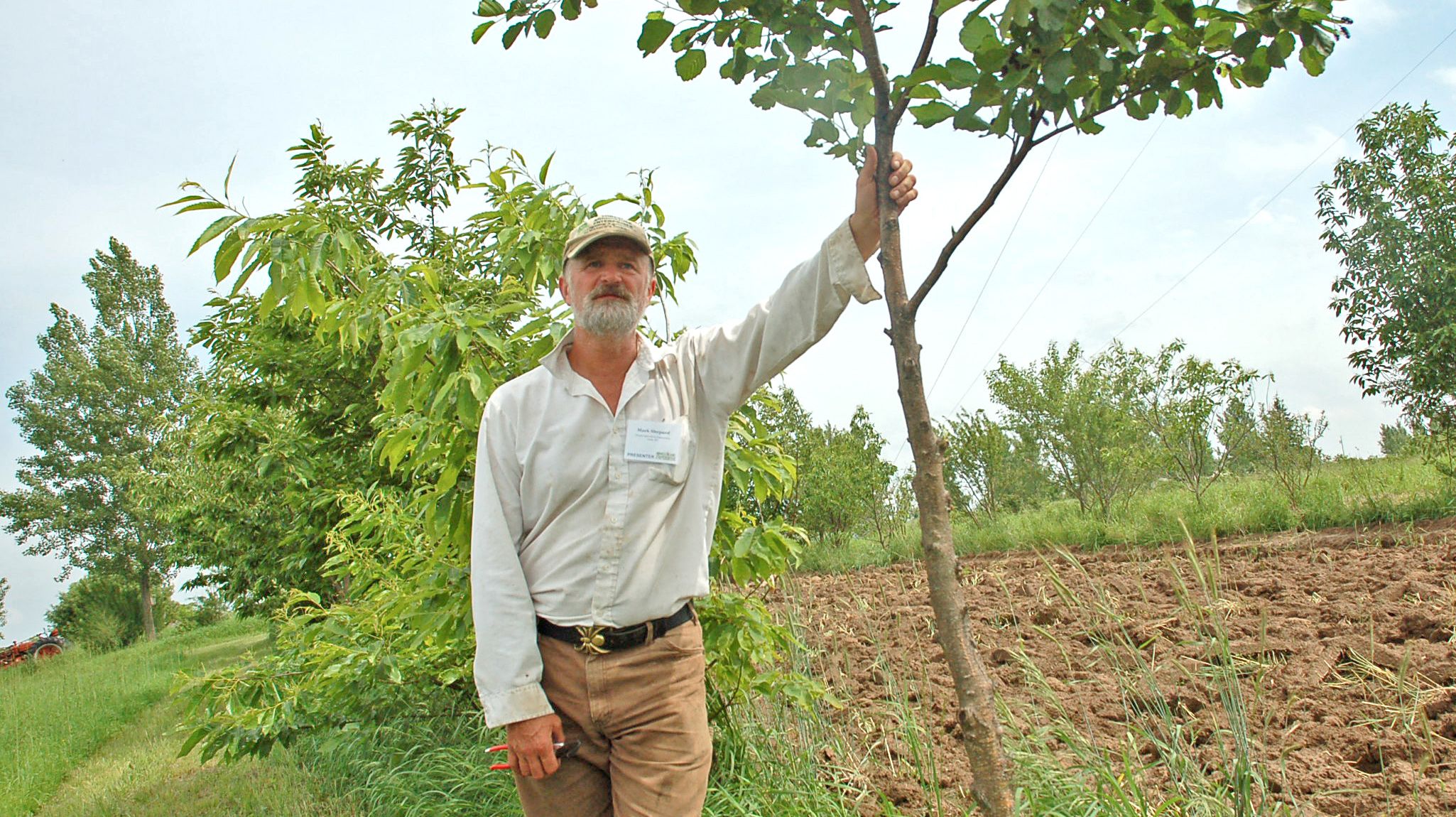
Mark Shepard - his belt may provide insight into his super powers
Mark Shepard founded and runs New Forest Farm, a 106 acre permaculture paradise in southwestern Wisconsin. Bordered on all sides by conventional corn and soybean production that is typical for that region, New Forest Farm is a beautifully designed anomaly that sticks out like a green thumb. Mark and his team have transformed a depleted and tired landscape into a vibrant and resilient ecosystem. His design, which mimics the oak savanna biome that is native to the region, has allowed for the expression of nature that is all too often suppressed by relentless annual production.
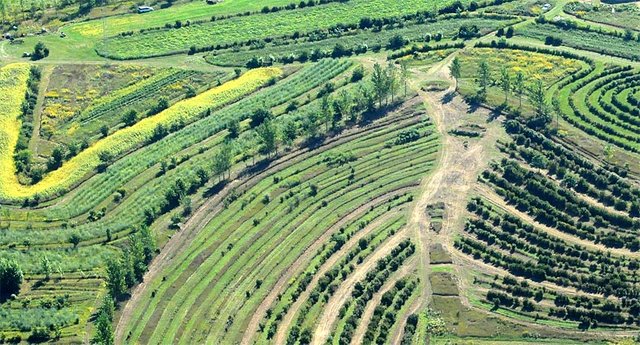
An overhead view of New Forest Farm, highlighting the natural contours of the land
In 1993, Mark received his diploma of Permaculture Design from the late, great Bill Mollison, author of Permaculture One and widely recognized as the founder of the international Permaculture Movement. For those unfamiliar with permaculture, it is essentially a "permanent agriculture" land-use strategy that utilizes perennial crops to design and establish landscapes that promote total ecosystem health and vitality. This is accomplished through observations and intimate study of one's landscape and history. In the years since studying with Mollison, Mark has been applying and refining his own particular brand of permaculture, one that I would describe as "no-frills gung-ho" after hearing him speak.
At one point during his keynote plenary, he asked the audience, "Who ate today?" Chuckles and mumbles swept through the room as acknowledging hands rose. He then laid out the reality of the involvement of machines in our food system and implored listeners to get over it and instead think about the possibilities of applying technologies and mechanical systems in new ways that could support a broad scaling up of permaculture practices and philosophies, thus allowing the concepts to reach their full potential. He was also dismissive of the notion of a completely local food system, pointing to a 70% reduction in agricultural yields in New York state last year that was the result of a historic drought. Mark argued that people in that situation would have starved without access to a broader regional, national, and even international food system. We will need all tools at our disposal as we move forward.
Click here to watch video of Mark's keynote plenary
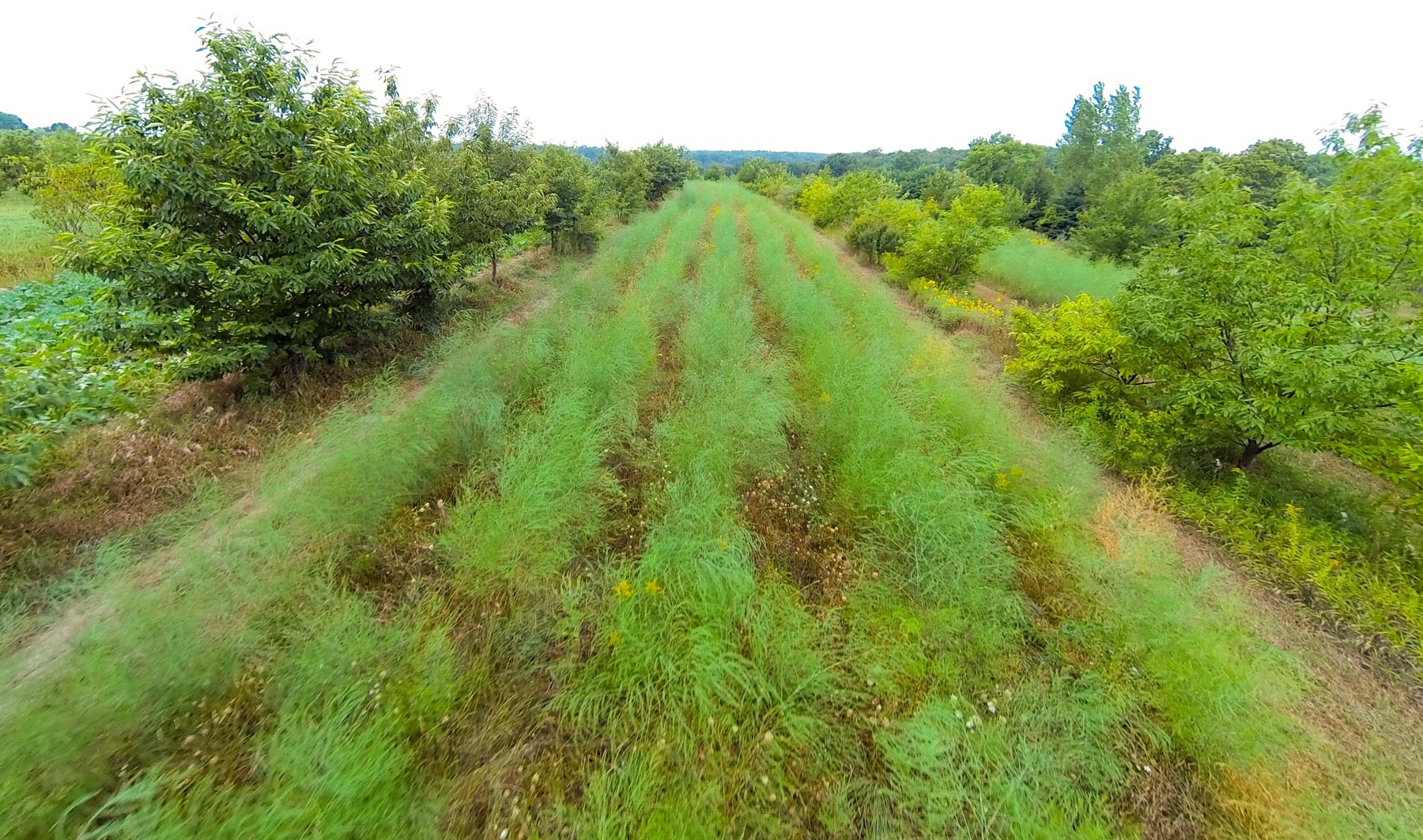
Asparagus alleycropped between rows of younger tree crops that still allow plenty of light through
Just as it is important to look at the ecological history of a place when determining how to design and develop it, Mark also wondered if people might look at their own biology to determine what sort of diet they should eat. By looking at the number of teeth that we have and examining their functions, we might develop a diet that is more aligned with our biology. For instance, with over half of our teeth being molars, which are meant for crushing and grinding green plants, perhaps our diet should contain that proportion of plants. Maybe 12% of our diet should be meat, since the gripping and tearing canines constitute 12% of our teeth.
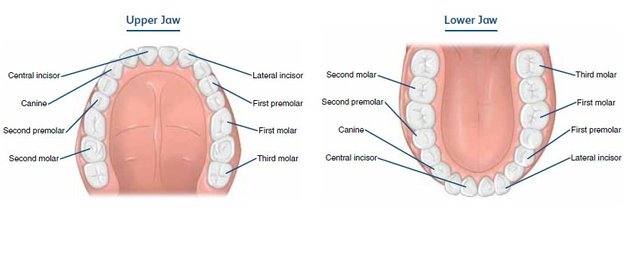
A map of the teeth in your mouth
Context-Specific Solutions
Mark pounded the idea of context-specific solutions and expressed the value of getting to know a place and its ecological history before undertaking any highly transformative endeavors. What works on your land might not apply to your neighbor's land down the street, let alone somewhere in the next town, state, country, or continent.
The importance of context-specific solutions cannot be overstated. Perhaps most beautifully, this encourages active humans to learn techniques and strategies from others in a collaborative learning environment. This knowledge and inspiration can then serve as the fuel to reimagine and rehabilitate one's own environment while celebrating the unique spirit each brings to the table.
I have only just begun to apply many of these ideas on my family farmstead in Vermont - Tapalou Guilds. It certainly takes time for these strategies to really take root, but as the old saying goes, the best time to plant a tree is yesterday. I've ordered hundreds of trees and shrubs from Mark's nursery, Forest Ag Enterprises, over the past couple years, and I was sure to tell him at the conference that I planted 70 of his Hazelnut shrubs and 20 Korean Stone Pine trees last year, to which he responded, "What are you going to do after lunch?" Ouch, Mark! Sure, on the scale that he is operating, my efforts are a drop in the bucket. But as we start to think about a cooperative model that encourages and incentivizes stewards of our lands to take restorative approaches towards agriculture, my drop joins with hundreds, thousands, millions and even billions of others to create a deluge of abundance and prosperity.
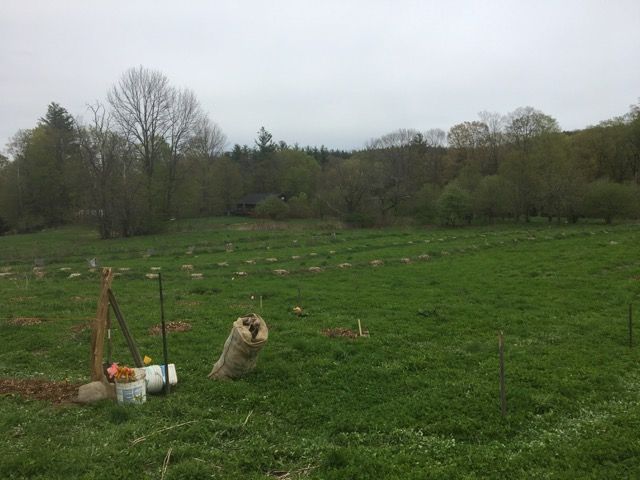
Nut and fruit trees and shrubs planted on contour at Tapalou Guilds
Mark's consulting and design firm is called Restoration Agriculture Development (RAD). Make no mistake, these are radical approaches for the times we live in. They are radical in their responsibility and ability to respond to a rapidly changing world, two features we must have if we are to create the lush and welcoming planet that future generations deserve to inherit. In a twist of sensational irony, the word spread just after Mark's speech that the United States had pulled out of the Paris agreement, which set benchmarks for greenhouse gas emissions meant to help our planet avoid a climate catastrophe. Nonetheless, this makes it even more clear that we will look more to visionaries and activists like Mark Shepard, more to each other and the people who will do good than we will to a central authority to fix the planet's woes.
PermaCryptoCulture
Much as Mark touted the role of mechanical systems to form a new permaculture paradigm, I would like to promote the exquisite symbiosis that I see developing in my own life, a marriage of permaculture and cryptocurrency. At first I thought it was a strange combination indeed - this technological community existing in the ether of the internet seemed a stark contrast to the nitty-gritty physicality of making a hole in the Earth and inserting a plant that would need my keen attention and help until it established its own rhythm with the elements. But I have seen life play out in strange ways and often times find that the best designs or intentions are the ones that reveal insights and results that are unforeseen. It is the beauty of being surprised.
And in this grand surprise, I am seeing people like @papa-pepper and @anwenbaumeister transforming the landscape around them and chronicling their endeavors for other people to see, generating inspiration and knowledge for their followers and financial resources and support for themselves. This is the beginning of an incredible closed loop system that urges us onward and upward and empowers those who are willing to put forth the effort. It allows us to decide where value will be placed, no longer beholden to the forces that exhaust the Earth in the name of profit.
Eventually the time comes to act and, for sure, there will be mistakes and setbacks. But a world of inaction and apathy lays a road with no good end. If we put our energy towards conscious adaptive systems - in our selves, our homes, our communities, our society, our planetary family - we at least have the opportunity to imagine a world where kindness and connection prevail and usher in a calmer existence that values gratitude and respect.
And at most? The possibilities are limitless like the space we are riding through in this beautiful blue ship. Let's get to work and tune it up for the next 4.5 billion years and maybe we can enjoy our brief time on board.
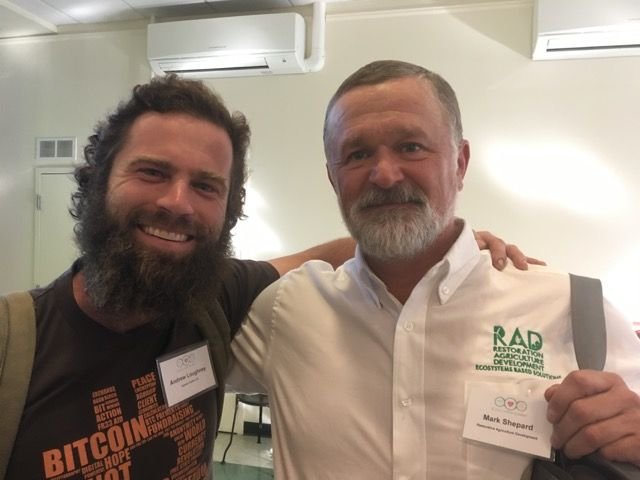
Me and Mark Shepard
Wow, really interesting read! I'm not familiar with permaculture, though I have several friends that run local organic farms. Thanks for introducing this to me. Any links you'd recommend to dive in a bit more? Followed.
So glad you enjoyed! This link is a good start for some of the basics, I think:
https://permaculturenews.org/what-is-permaculture/
Here you can check out Mark's projects, a bit more in depth:
http://restorationag.com/
And a good book to get started is Gaia's Garden by Toby Hemenway. Mark also has a book called Restoration Agriculture, but again, it's a bit more advanced.
Tons and tons of videos out there too. This guy is another of my favorites:
http://www.permacultureorchard.com/
Enjoy, and please follow up if you have any more questions or thoughts!
Dear @anarchrysalis. I came to this post through my GINAbot giving me notice, that you saif "Permaculture" while answering someone else on an other old post of yours.
I want to share my gratitude for this post, as Mark Shepard is a master of Permaculture that I admire very much. During my last years PDC I encountered him through Permaculture Voices adn was stunned ba his STUN approach concearning tree selection. Back then it was sher, now adays its strategic... haha. Anyhow. his work is truely amazing and very inspirational.
Well and you too seem very knowlegable about Permaculture, which makes me think whats going on at Tapalou Guilds, as the link above is not working.
I hope your doing fine and I will follow along from now on, waiting for more Permculture bits and pieces.
All the best.
Moritz
Thanks for the great comment! Mark is the man. I hope to contribute some good insights as well! Take care.
Wunderbar, so wunderbar ! Thanks for sharing.
You bet! Wunderbar!
Thank you for posting this man, invaluable information, more people need to understand the effects of monoculture vs permaculture.
Thanks for reading and I'm glad you enjoyed it. Yes, just trying to spread the word about these passions of mine that will have tremendously positive impacts on our world.
Right on.. I love permaculture as increased productivity leaving the world a freer and better place .. I was an environmental scientist/student for almost 2 decade.. air quality was a specialty.. the CO2 thing is attempt to hijack the real lib/eco movement, "global-warming from CO2" 'carbon-tax' a hoax.... however climate change is real entering solar minimum and growing conventionally will become big problem and even for permaculture a challenge.. adaptibiIity is key, I currently need to research-find guidance on integrating cannabis/hemp and hops into an integrated permaculture production. We could create a PERMA token for trade... permaculture and as far as I can tell crypto, are non-zerosum games. Nice shirt, I need that shirt.